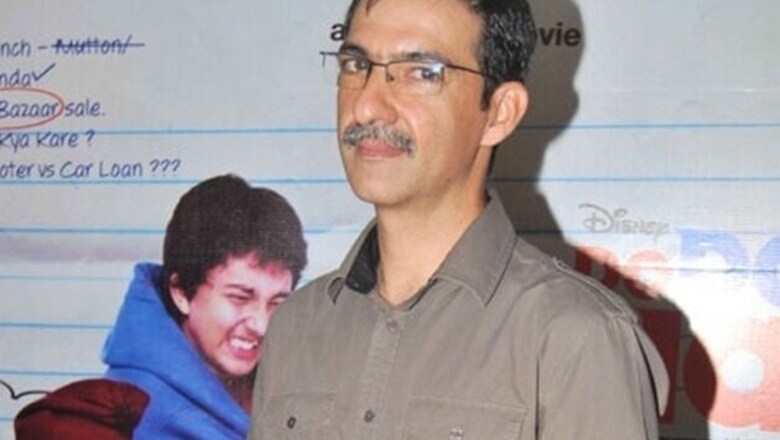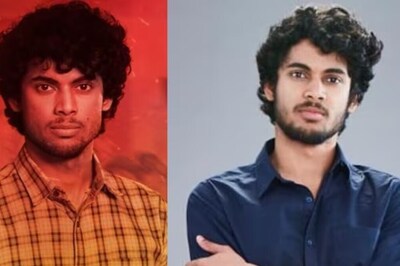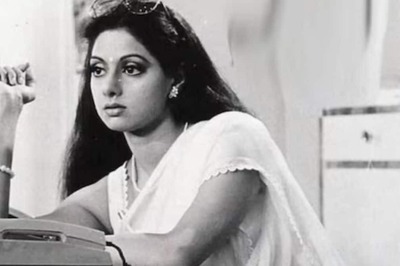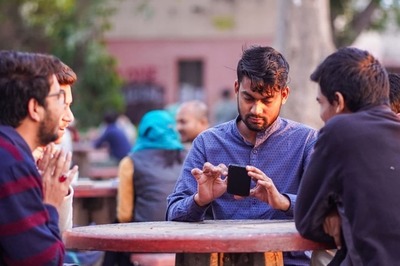
views
New Delhi: Arjun Kapoor saunters in to the area designated for media interactions. We have been waiting for over one and half hours now but that perhaps is not the 26 year old debutant actor's concern.
His hairstyle is designed to look stylishly messy, much like that of Parma, the small town boy that he plays in 'Ishaqzaade'. But for now, he must wait for a few minutes before the film's leading lady Parineeti Chopra announces her arrival. And somewhere before Parineeti's loud talk and after Arjun's star walk, was the unannounced entrance of the film's director, Habib Faisal.
The trio begin the drill with an interview to a TV channel: Parineeti proclaims herself to be 'the singer,' Arjun too finds his star voice and challenges the reporter to get down and learn the dance moves but director Habib Faisal has no grand claims to make. Yet Faisal has managed to voice a lot more through his films than what the two stars manage with their pomp and show. From his story of the young and restless in 'Band Baaja Baarat' to now his trigger-happy lovers in 'Ishaqzaade' – Faisal has captured the real India minus the gloss of cinema without compromising on the filmi hooks (read song and dance routines and the dialogue-baazi) to ensure distributors. He is certainly a part of the extraordinary league of realistic filmmakers including the likes of Anurag Kashyap and Dibakar Banerjee.
'The final push was when I finally had something to say and share it on my own terms,' says Faisal in his self-assured baritone on turning director with 2010's 'Do Dooni Chaar,' a film that quirkily looked into the aspirations of a middle-class family from Delhi's Lajpat Nagar - that of owning a car.
The germ of the idea came with the launch of Tata's one lakh rupee wonder - Nano. 'Everybody had their first car story. Everybody wanted their own car,' says Faisal who used to be a cameraman with NDTV before diving into scriptwriting and filmmaking. “I have done one MA from Jamia, a Masters from Illionis and five years of ‘getting to know India’ with NDTV.” The job required Faisal to travel across the country and served as a fast track lane to 'cricketers, industrialists, swanky offices, poor towns… I never knew places like Jagatpur existed!'
Yet his initial few projects as a scriptwriter in the film industry were movies like 'Salaam Namaste,' 'Ta Ra Rum Pum' and 'Jhoom Barabar Jhoom' - all set out of India, let alone the real India that Faisal has come to have known for scripting so well. Those films, however, failed to make any dent critically or commercially. 'The society is ever evolving, so does its popular culture like films, arts, etc,' says Faisal defending the films that he believes had been designed to cater to then dominant NRI audience. The flush of such films was followed by a slump in their collections. ‘Soon small budget films made big budget formula question itself,’ says Faisal quoting examples like 'Bheja Fry'. But much before that, there was 'Munna Bhai'. “In fact, ‘Munna Bhai’ was meant to be a small film. Rajkumar Hirani took Sanjay Dutt who was not that big (at that point of time.) Nor was Arshad Warsi. And it was a film about Gandhian philosophy.” he says about 2003’s ‘Munna Bhai MBBS.’
Three years after ‘Ta Ra Rum Pum,’ the last of his dramas about NRIs, Faisal returned with two stories set in Delhi - 'Band Baaja Baraat' and 'Do Dooni Chaar' both of which got a nod for being in tune with the capital’s middle class. 'When I set it in Janakpuri or Lajpat Nagar it becomes more relatable,' adds Faisal who himself looks like a Dilliwalla corporate in his crisp shirt and bespectacled look.
He listens to the questions directed towards him and chooses his words like he refers to producers as ‘money bags’ and finding one for his first directorial venture, ‘Do Dooni Chaar’ was anything but difficult - 'I don't have a story of knocking on 10,000 doors. I got lucky,' says Faisal about selling his story of Lajapt Nagar's Duggals whose ambition is driven by a car which for them holds the promise of an instant status upgrade.
'There are takers for good stories,' he adds. So he is now aiming at another hit with his latest, 'Ishaqzaade' that releases on 11th of May. But even till a few days back, he had been busy putting finishing touches (technical details regarding the picture and sound quality of the film that he carefully explains) to it - 'Everyday it's like a butterfly factory.' So is he happy with the butterfly called ‘Ishaqzaade’? 'Films are not personal indulgence, they are not bathroom singing.' This explains why Faisal takes care to keep his films real and relatable, assimilating the concerns and conditions of the middle class everyman. Looking at that, perhaps it can be pre-empted that everyman will be the star of his 'Ishaqzaade' as well. And while its promos and trailers are all blazing guns and chases, Faisal confirms that this one is a love story. 'In our films we have taken falling in love for granted. Love is still a taboo.' Faisal goes on to describe the state of love in the times of globalization - how whether in case of the rich or the poor, small towns or big cities, something as fundamental as love is still frowned upon. How a boy and girl in love still need to convince their parents in order to marry. And how when they DO tie the knot, their parents twist the so-called drawback into their USP and then go on to proudly announce their child's accomplishment: 'Humaari beti ne toh love marriage ki hai,' sing songs Faisal in that typical Delhi accent. His 'Ishaqzaade' too are creatures of love with love being their raison d'être.
PS: About ten minutes into the interview, the ever-smiling yet assertive public relations representative did his bit by signaling that I had crossed my designated time limit. Naturally, I had little time OR choice to continue. But when I did ask Mr Faisal about a possible follow-up via email, he almost laughed, ‘If only I had the time to respond to an email…’ He politely thanked before being ushered to the next interview.
####


















Comments
0 comment